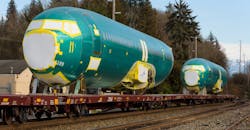Spirit AeroSystems Doubts its Own Future
Spirit AeroSystems, the manufacturer of commercial aerostructures and a significant supplier to both Boeing and Airbus, warned in a 3Q statement that its cash reserves are shrinking, and its survivability is in jeopardy. “Substantial doubt about the company’s ability to continue as a going concern exists,” it stated.
Wichita-based Spirit manufactures fuselage structures for the Boeing 737 MAX and 787 Dreamliner, among other aircraft programs. It has been linked to multiple quality defects in Boeing aircraft over recent years, notably the January incident in which the sidedoor plug of a 737 MAX 9 jet was blown open during a flight.
But Spirit’s problems predate that event. Its production delays meant it consistently fell behind delivery schedules for Boeing, which reportedly led the OEM to implement a practice of taking delivery of unfinished structures and advancing aircraft through production steps as work continued behind scheduled – a practice called “traveled work.”
Throughout this period, Spirit endured consistent cash-flow problems. Boeing invested $100 million in Spirit last October and agreed to pay more for aerostructures in order to help keep its supplier viable.
Chronic structural defects began to become more frequent for Boeing and its customers in the months prior to the January incident. Following that, the FAA and NTSB officials implemented oversight of Boeing’s 737 program, and the consequent manufacturing slow-down intensified the financial and organizational problems for Spirit AeroSystems.
“On March 2, 2024, Boeing announced they would no longer accept deliveries of product that required out of sequence assembly or incremental quality re-work,” according to Spirit’s statement. “As a result, the company has experienced higher levels of inventory and contract assets and lower operational cash flows due to the inability to physically ship and invoice end items to Boeing in a timeframe aligned with production activities.”
In the midst of its own organizational problems but still determined to keep the supply chain intact, last summer Boeing agreed to buy the business for approximately $8.3 billion, which includes Spirit’s current debt total.
Last month Spirit said it had spent $350 million that Boeing advanced when it agreed to acquire the supplier.
That deal has been set to be completed midway through 2025, but the recently settled seven-week strike for Boeing’s 737 MAX and 777 programs brought new financial distress to both Boeing and Spirit.
“We retain a range of options and levers to address our financial and spacing constraints and are working with our customers on these matters," a Spirit AeroSystems spokesman stated.
Boeing has not commented on Spirit AeroSystems’ problems since the strike began in September.
